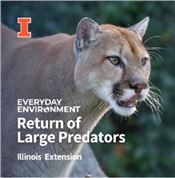Mountain lions on the move through Illinois, not here to stay

“These animals periodically wander into our state which is exciting, but most of Illinois does not have the habitat to support populations so they will continue to move on,” says Peggy Doty, University of Illinois Extension natural resources, environment, and energy educator.
Doty recently led a program, available at go.illinois.edu/ILlargepredators, about the return of apex predators exploring behaviors, ranges, and identification.
Mountain lions, also known as cougars and pumas, were historically found across North America but are now primarily in the western states. Young male mountain lions wander large distances as they look for a forested territory of their own. Their minimum home range is about 70 square miles. DNA testing of cougars previously found in Illinois showed they were originally from the Black Hills in South Dakota.
“Apex predators are crucial to maintaining the overall health of natural systems,” Doty says. “Illinois has a large population of white-tailed deer due in part to the lack of predators.” While predators are an important part of the ecosystem and research from the Illinois Natural History Survey shows people in Illinois have a neutral stance on their recolonization, Doty says there are no plans to reintroduce them to the state.
Illinois does not have the habitat to support large predators. Southern Illinois has the most woodlands in the state and at most might support 10 mountain lions if it were entirely forested and didn’t have so many roads says Joy O’Keefe, University of Illinois Natural Resources and Environmental Sciences Assistant Professor and Extension wildlife specialist. To coexist with large cats and other predators is a matter of tolerating them as they move through the state.
"We’ll need to learn how to live with them during the periods when they move through – keeping pets and children indoors or under supervision if near locations where the animals are seen and adopting anti-predator behaviors," O'Keefe says. ∆